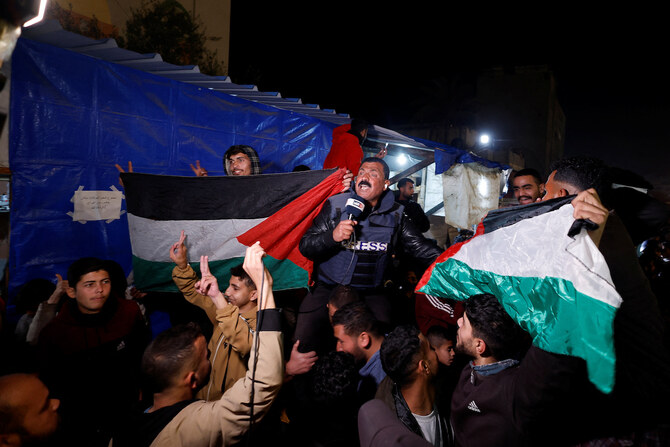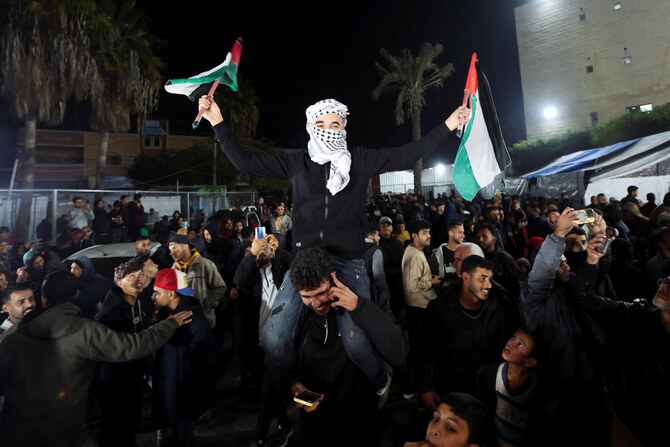DOHA: Qatar’s prime minister announced that Israel and Hamas had agreed Wednesday to a ceasefire and the release of hostages held in Gaza, adding he hoped the deal would pave the way for a permanent end to the fighting.
After mediators earlier said a deal had been reached, the office of Israeli Prime Minister Benjamin Netanyahu cautioned that some issues in the framework remained “unresolved,” though it hoped the “details will be finalized tonight.”
Israeli President Isaac Herzog, who holds a largely ceremonial role, said the deal was the “right move” to bring back hostages seized during Hamas’s October 7, 2023 attack that sparked the war.
Qatari Prime Minister Sheikh Mohammed bin Abdulrahman bin Jassim Al-Thani told a press conference that the ceasefire would take effect on Sunday.
“The two belligerents in the Gaza Strip have reached a deal on the prisoner and the hostage swap, and (the mediators) announce a ceasefire in the hopes of reaching a permanent ceasefire between the two sides,” he said.
The first phase of the deal would see Hamas release 33 captives, he added, “including civilian women and female recruits, as well as children (and) elderly people... in return for a number of prisoners who are being held in Israeli prisons.”
Demonstrators in Tel Aviv calling for the release of the hostages embraced as news of the agreement spread, while thousands across Gaza celebrated the deal to halt the hostilities that have devastated much of the Palestinian territory.
“I can’t believe that this nightmare of more than a year is finally coming to an end. We have lost so many people, we’ve lost everything,” said Randa Sameeh, a 45-year-old displaced from Gaza City to the Nuseirat refugee camp in the central Gaza Strip.
Hamas said the ceasefire was the “result of the legendary steadfastness of our great Palestinian people and our valiant resistance in the Gaza Strip for over 15 months.”
Pressure to put an end to the fighting had ratcheted up in recent days, as mediators Qatar, Egypt and the United States intensified efforts to cement an agreement.
On Wednesday, Qatar’s Sheikh Mohammed said the three countries would monitor the implementation of the ceasefire via a body based in Cairo.
US President Joe Biden said he was “thrilled” at the development, adding the deal would “halt the fighting in Gaza, surge much needed humanitarian assistance to Palestinian civilians, and reunite the hostages with their families.”
The agreement came after months of failed bids to end the deadliest war in Gaza’s history, and days ahead of the inauguration of Biden’s successor Donald Trump, who hailed the deal even before it was officially announced by the White House.
Trump had warned Hamas of “hell to pay” if it did not free the remaining captives before he took office, and envoys from both his incoming administration and Biden’s outgoing one had been present at the latest negotiations.
“This EPIC ceasefire agreement could have only happened as a result of our Historic Victory in November,” Trump said on social media.
The president-elect added that his White House would “continue to work closely with Israel and our Allies to make sure Gaza NEVER again becomes a terrorist safe haven.”
Hamas sparked the war in Gaza by staging the deadliest-ever attack on Israel on October 7, 2023, resulting in the deaths of 1,210 people, mostly civilians, according to an AFP tally of official Israeli figures.
Palestinian militants also took 251 people hostage during the attack, 94 of whom are still being held in Gaza, including 34 the Israeli military says are dead.
Israel’s retaliatory campaign in Gaza has killed 46,707 people, most of them civilians, according to figures from the Hamas-run territory’s health ministry that the UN considers reliable.
Egyptian President Abdel Fattah El-Sisi pointed to the “importance of accelerating the entry of urgent humanitarian aid” into Gaza, as he welcomed news of the deal.
Egypt’s state-linked Al-Qahera news outlet cited a security source as saying coordination was “underway” to reopen the Rafah crossing on Gaza’s border with Egypt to allow the entry of international aid.
The state-owned Al-Ahram newspaper also reported that talks were underway to open the crossing.
Among the sticking points in successive rounds of talks had been disagreements over the permanence of any ceasefire, the withdrawal of Israeli troops and the scale of humanitarian aid for the Palestinian territory.
The UN’s Palestinian refugee agency, UNRWA, facing an Israeli ban on its activities set to take effect later this month, said it will continue providing much-needed aid.
Netanyahu, who vowed to crush Hamas in retaliation for the October 7 attack, has opposed any post-war role for the militant group in the territory.

















